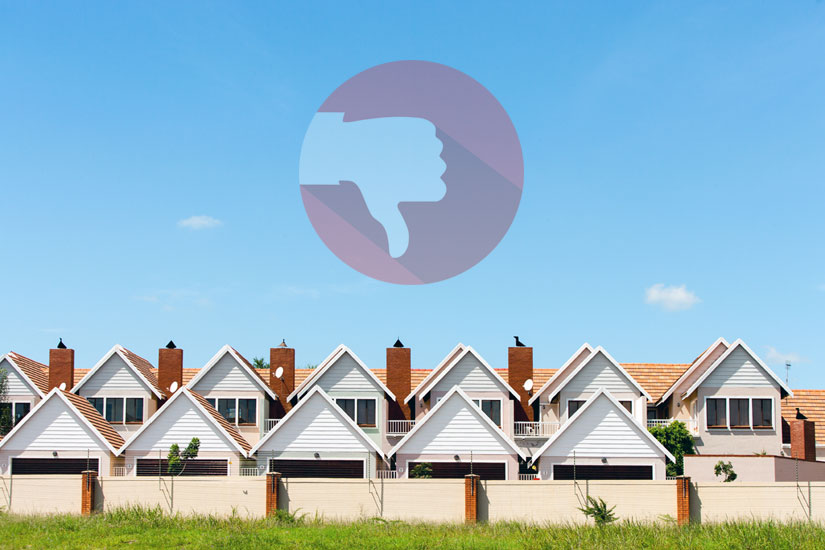Many people believe that retirement communities are the answer to all their problems as they consider retirement options.
Joining a retirement community is not the perfect solution. The decision to invest in one should be taken with consideration because it is not easily reversed. Lack of age diversity, isolation, restrictive home association regulations, smaller homes, and higher cost of living are some disadvantages to a retirement home. If yours ends up not being the right fit, it can be an expensive and stressful option to reverse.
Heavily researching retirement communities can save your health, time, and money.
Table of Contents
Not a perfect solution
If you’re someone that enjoys their independence, you may be upset at having to give it up. Retirement homes have rules and regulations that you have to abide by. If you’re someone that enjoys solitude and quiet, you may find retirement communities a little bit too loud. The reality is, some people’s personalities are not a good fit for a retirement community.
Moving can be a downside when moving to a retirement community. You will have to downsize your belongings significantly and say goodbye to many valued items. If you don’t want to get rid of the things, you may have to actually pay for storage. Unfortunately, after you have gotten rid of your belongings, you will then have to move somewhere unfamiliar. This can cause depression and anxiety.
When it comes to caring for seniors’ health, retirement communities are not the best option. Due to the low wages of the staff at these facilities, it is more common to experience high staff turnover, and therefore, lack of care. This low wage model, unfortunately, keeps the most skilled caregivers seeking employment elsewhere. It is essential to look into the ratings and reputations of facilities as they are not all equal. Don’t be afraid to ask the turnover rate and how much training goes into the staff (The Motley Fool).
For those with dementia and cognitive disabilities, seeing too many faces due to high turnover may do more harm than good. A quick way to find out the kind of staffers you’re dealing with is by asking them how long they’ve been employed at the facility. Asking to meet with the facilities’ top executive is a great way to find out the kind of care that is given. If a brief meeting is declined, take that as a red flag and move on (NY Post).
There are pros and cons to moving to a retirement community. First, we will focus on specific disadvantages.
Cons of retirement communities
Lack of age diversity
Socially, if you’re used to friends of all ages, you might be frustrated with the lack of young people to interact with. It can be visually depressing as you watch older folks come in; frail and unable to help themselves. For those that are used to an active lifestyle, it may not be all that it’s cracked up to be (The Motley Fool).
Active adult communities usually require at least one person within the residence be at 55 years or older. This creates a lack of age diversity. For some, the lack of young people is entirely appealing. For others, they may find comfort and energy in a lively community.
Because of the 55 years or older rule, young families are not able to take advantage of the real estate investment. If you are viewing your retirement community as an investment, be aware that your younger family members may not be able to stay if no one older than 55 is at the residence (MyLifeSite).
Being too isolated
Many retirement communities lie on the outer edges of a metropolis area. For those that are looking for peace and quiet, they may find this to be a perfect option. For seniors that are used to being busy and social, they may find this isolating and boring. If this could potentially be a problem, it is suggested that you seek one within a city. Look for a facility that has an active calendar of events and transportation provided (55 Community Guide).

Homeowners Association
It is unfortunate that some homeowner’s associations are not only restrictive but even invasive. If you value your independence, this may not be the best option for you.
You may be told what plants you can sow, what decorations you can put up, and even what color to paint your house. Do yourself a favor and read all the community guidelines before choosing. Don’t be afraid to ask about the rules. If they are not willing to answer them, it is probably not the community for you (55 Community Guide).
Smaller homes
Depending on your preference, you may find that the homes are too small. Though the idea is to have a small house to care for, it can still feel cramped. If you have grandchildren, it may seem even miniature. If you are less mobile and active then you used to be, you may find yourself bored and cooped up during the winter. Be sure to really think about the square footage and layout of the home before you consider buying (55 Community Guide).
A higher cost of living
The amenities at a retirement community can be something to look forward to. It is unfortunate though that it usually comes at a higher cost of living. It is nice to have clubs, pool houses, shuffleboards, and tennis courts coupled with classes and club activities within your community. Just be aware that those come with a high price tag. Retirement communities tend to be gated and have pristine landscapes. Most have pest control, weed control, and other services that will make your life easier. Easier, but unfortunately, costs more (StateofFloridaLiving).
Even if the amenities are advertised as free, if they are not something you were going to use, it may end up a waste of your money. Maintaining golf courses and luxury clubhouses do not come cheap. Be sure that you’re going to use what you pay for or the homeowners association fees may end up taking more of your income than necessary (Baby Boomer Retirement).
Living in these gated communities will cost you much more than just owning a house in a typical neighborhood without a homeowners association. It’s unlikely that you would buy a home you cannot afford, but make sure you consider whether your income is fixed. As time goes on, if your income does not match inflation, you may find yourself losing money (StateofFloridaLiving).
It’s hard to sell your home
If you do move to a retirement community and find that it’s not a good fit, you may decide to move. As you get older, it is important to realize that moving costs more. The older you become, the more disruptive and expensive moving is. On top of the fact that it’s hard to move, only people 55 and older will be able to buy your home. This means that only a small percentage of the market is ready to help you.
If you live in a community where they are developing new homes, it may even be harder to sell it as the new homes can be offered at a lower price than yours if the market is slow. Be sure to check the rules and regulations as some don’t allow you to put up a for-sale sign in your yard. This can make finding your home difficult for potential buyers. Be sure to do your research and make sure that the retirement community is right for you (StateofFloridaLiving).
Some may not accept Medicaid
Retirement communities receive less compensation for Medicaid than residents that pay out of pocket. What this means is, Medicaid-eligible residents may be less desirable financially.
It’s not uncommon for facilities to request documentation showing they have enough money to pay upfront for several months. Some facilities do take Medicaid, and some don’t.
Some states and facilities only have a limited amount of slots for Medicaid eligible residents. Sometimes when self-paying residents run out of money, they are told there are no Medicaid slots available to them. One of the ways to avoid this problem is to give a facility advanced notice that you are applying for a Medicaid spot (NY Post).
Reviews and ratings
Unfortunately, assessing retirement communities is not that simple and easy. Many states don’t post-examination records online. There is also no Yelp for retirement communities. The reality is, there is a lack of complete information in regards to the quality and standards for retirement communities. You can, however, ask for the facilities licensing survey.
Retirement communities are not like nursing homes, which are federally regulated. Oversight for retirement communities ends at the state level. Things to look out for in the survey are unsuccessful fire drills and reoccurring infractions. This is why checking for high turnover and cooperation from the staff is a great way to get perspective on a retirement community’s capability (NY Post).
Pros of retirement communities
Save money and time
It is possible actually to save money moving to a retirement community. For those with larger houses, selling and downsizing to a smaller home can be financially favorable. Some of the layouts for retirement communities allow the clever use of communal space requiring less square footage to live a full life. Due to the decrease in square footage, it may help save time with chores as well. Yard care, cleaning, and maintenance are taken care of. For those who value time, this can allow you to explore new hobbies and interests as you enjoy retirement (SixtyAndMe).
A wide range of activities
The number one perk of being in a retirement community, according to those surveyed, is the full range of activities available. Depending on your community, you may be able to play golf, tennis, and swim. You may be able to engage in the arts, tend to a garden, watch live theater, and even do woodwork! Most retirement communities will have clubs and social activities on the calendar you can join (Baby Boomer Retirement).
For those that are active and trying to stay spry, this is the number one way to enrich your retirement. As long as you are in good health, you will find these social aspects very fulfilling (MyLifeSite).

Safety and security
Safety and security is the second best reason to join a retirement community. Most retirement communities tend to be gated with 24/7 private security. The guards at these communities tend to make themselves visible throughout most of the day. Most residents will be home during the day, so, if someone tries to break into a house, it’s unlikely they won’t be noticed (Baby Boomer Retirement).
No wild parties
There’s nothing wrong with having fun in a retirement community. With all the options for social interactions, clubs, and fun, it should be someplace you enjoy. The truth is, most people over the age of 55 or older have a great time while still respecting the noise level tolerance of their neighbors.
It’s highly unlikely that anyone over 55 will be throwing loud and obnoxious parties.
If someone like that were to move in and start disrespecting everyone’s peace, the homeowners association would step in and make them familiar with the rules, or kick them out. It’s not impossible, but very unlikely, that you experience rude, destructive behavior while in a retirement community (StateofFloridaLiving).
Close to medical facilities
Due to the nature of the community, medical facilities tend to be close by or on the campus. These communities prioritize getting residents to nearby health facilities if an event were to occur. If the health problems are acute, it may be worth considering an assisted living or nursing home (Baby Boomer Retirement).
Final word
Retirement communities are not a one-stop-shop for seniors looking to retire comfortably.
There are a lot of drawbacks to consider as your decision ends up being mostly permanent. You can expect to have a higher cost of living, less freedom, and less space. Homeowners associations can be your best friend or your worst enemy as they can restrict you from painting your house a specific color or from choosing the kind of plants you get to put in your garden.
Now there are, of course, benefits to retirement communities such as safety, strong social circles, and more time to engage in hobbies due to less maintenance in your life. The most important thing is, to ask questions, and find out if the retirement community is a good fit for you or someone you love.
References
Deborah-Diane. “Baby Boomer Retirement.” Advantages and Disadvantages of Over 55 Retirement Communities, 1 Jan. 1970, www.baby-boomer-retirement.com/2013/03/advantages-and-disadvantages-of-over-55.html.
Fowler, Robert. “Downside of 55 and Older Communities.” 55 Community Guide, 20 Aug. 2016, www.55communityguide.com/article/downside.html.
Maranjian, Selena. “Retirement Villages: Pros and Cons.” The Motley Fool, The Motley Fool, 4 Jan. 2015, www.fool.com/retirement/general/2015/01/04/retirement-villages-pros-and-cons.aspx.
Marketwatch. “10 Things Retirement Communities Won’t Tell You.” New York Post, New York Post, 20 July 2014, www.nypost.com/2014/07/20/10-things-retirement-communities-wont-tell-you-2-2/.
“The Pros & Cons of 55 Active Adult Communities.” MyLifeSite, 10 Apr. 2018, www.mylifesite.net/blog/post/pros-cons-55-active-adult-communities/.
“Pros and Cons of Living in a Retirement Village.” Fashion Hair Makeup for Older Women Senior Dating Travel, 5 May 2016, www.sixtyandme.com/pros-and-cons-of-living-in-a-retirement-village/.
“The Pros and Cons of Moving to a Florida Active Retirement Community .” StateofFloridaLiving.com, www.stateoffloridaliving.com/retirement-communities-pros-cons/.
